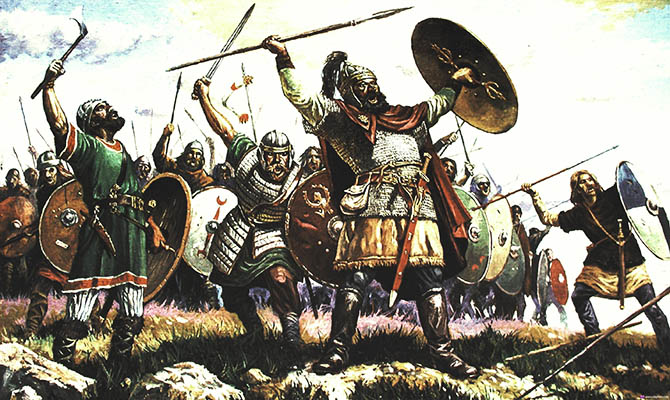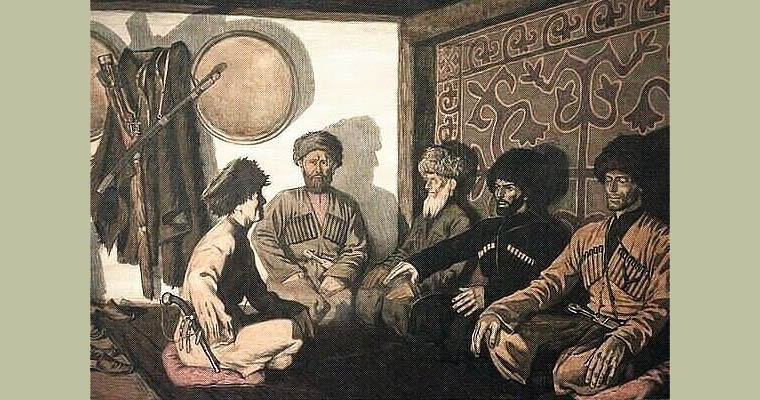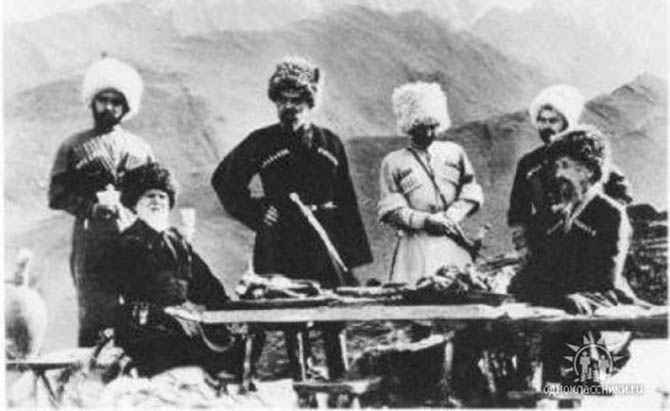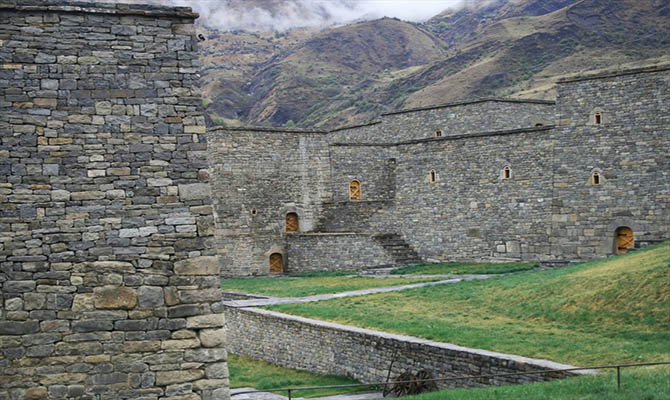
Clash of our civilization can be compared in many respects with the clash of the Greco-Roman world from the barbarians. True, it is necessary to stipulate that the majority of the Chechen diaspora and apparently educated Chechens living in the cities are integrated into modern society. Developing the analogy, they can be compared with the Hellenized (or Romanized) Gauls, Germans, Sarmatians. Ancient authors were separated barbarians to the east and north. Chechens, despite their common identification, and recently more and more vigorous self identification with the Islamic civilization, northern barbarians rather than east on this classification. And adat (customary law, “the law of the mountains,” similar to the “law of the jungle” – Kipling described the orders of the wolf pack) have always prevailed over the Shariah. And the place of “oriental despotism” is traditionally held “military democracy”
Tacitus and the “Chechen question”
“If the community in which they were born to become numb in lasting peace and idleness, a lot of noble young men are sent to the families involved in any war, because the peace that the people do not like, and since it is easier among the vicissitudes of battles fame , and contain a great squad, you can not otherwise than by violence and war. And much more difficult to convince them to plow the field and wait for a crop year, than to bow to fight with the enemy and endure injuries; more than that, in their opinion, then produce something that can be acquired with blood, – laziness and cowardice. ” For almost two thousand years ago, he described the Germanic Roman historian Cornelius Tacitus. Striking similarities between the modern Chechens (and even more Chechens XIX century) and the Germans described by Tacitus. I recall a raid Shamil Basayev into Dagestan, “the heroes of the liberation war” did not like being “in the long-term peace and idleness,” to which they were condemned in 1996 – 1999 years. But let us continue to quote Tacitus’ book “On the Origin of the Germans and the location of Germany.” “When they do not conduct wars, then … spend time in complete idleness, indulging in sleep and gluttony, and the most courageous and warlike of them, without incurring any responsibility, consigns care of housing, household and arable land to women, the elderly and the most feeble of households whereas wallow themselves inactive … “. Contrary to popular belief that the Chechen women as “oriental woman” traditionally occupied mainly in the household and often spend time in a shelter, they are, at least in the Soviet 80s, on the contrary, showed a high economic activity and are often fed family. This division of labor Chechen society is regarded as the norm: a woman is busy routine daily work, and the man – a warrior and hunter (in rural areas). And parallel to the famous Caucasian hospitality we find in the “German” of Tacitus. “There is no other nation that with the same hunting would be undertaken more revelry and would be as hospitable. Deny anyone in the shelter, in their view – the wickedness, and everyone tries to regale guests in a measure of prosperity. Obeying the laws of hospitality, no one makes a distinction between the familiar and the unfamiliar. ” It is not like the modern Germans, these Germans described by Tacitus! And like their customs on the traditions of the Caucasus! You can still go on these parallels, which see, above all, in the ethno-psychology, but sometimes affect even small household items. Is modern Chechens with their affection and passion for weapons firing into the air from the machines simply by an excess of emotion does not look like the ancient Germans, who were armed to the meeting and he expressed his approval rocking spears? And the “Vainakh democracy”, which proclaimed Chechen separatists, apparently, is nothing but a form of “military democracy” inherent, according to Morgan and Engels, “the highest stage of barbarism” that preceded the formation of the state. A comparison with the ancient Germans said that the current Chechen society is such, what it is, not because of continued ethnic psychology, and not under the influence of Islam, but because of the general characteristics of a certain stage of social development. After all, once the ancestors of the Danes and the Swedes under the name the Vikings terrorized Europe and Byzantium its predatory sea raids. And just shocked her sudden appearance of the civilian population of the then megacities like Barayev detachment Muscovites. And the Russian Cossacks as a frontier subethnos in XVII – XVIII centuries, before beginning to plow “Wild Field”, is widely practiced robbery ( “trips for his coat”), which is in their midst is not considered something shameful and glorified as “prowess.” Alpine mountaineers Helvetii – the ancestors of modern Swiss – in Caesar’s time were considered one of the most ferocious and warlike peoples of the West. And the founder of Rome Romulus was the leader of a gang of robbers. A famous agoge consisted, among other things, that the teenagers were taught to steal from the surrounding population, did not belong to the free citizens of Sparta, and even secretly kill the members of this population, just “for the training of military skills.” For some peoples of the ancient world, as noted by ancient writers, robbery over the centuries became just the main form of economic activity. As Thieves (latrones) ancient geographers and historians have characterized, for example, Cilicians (inhabitants of the south-eastern part of the peninsula of Asia Minor) or Ligurian (inhabitants of the north-west of the Apennines). All of these nations was attributed to the quality that the Romans called audacia. This word was known, and the courage of a warrior, and daring bandit. The objective prerequisites for the formation of the economic structure is often served as a dwelling in the mountains, unsuitable for agriculture, but located far from the trade routes. Animated dinosaur is recognized that in the XIX century, the Chechens were incorporated into the Russian Empire, while at the “highest stage of barbarism”, to use the classification of Morgan – Engels. Under the rule of “white king” Chechens actually enjoyed autonomy or, if you were living on a reservation: the central government authorized the traditional forms of local self-government and officially recognized action in Chechnya and adat norms of Sharia. Much more intensive integration of Chechens in modern society is engaged in the Soviet power, creating, by the way, writing in the Chechen language and fully contributes to the formation of the Chechen intelligentsia. However, the Chechens and the Soviet years lived mostly in rural areas tended to be the traditional “rural culture”. And this region, with its high birth rate, has always had surplus manpower. The Soviet regime was a miracle and actually held the young unemployed men in the “long-term peace and idleness.” The charge accumulated unspent energy for a long time. The explosion occurred with the collapse of Soviet civilization with its distributor – egalitarian socio-economic system, ideology, culture and repressive mechanisms. In fact, Chechnya has never been a “normal” part of the post-Soviet Russia: a renegade province, “filibustering republic” or a conquered province, where power rests on bayonets. Chechens almost gradually integrated into the Soviet empire (and many of them quite firmly charge of the corresponding Soviet imperial spirit), but did not become Russians, perhaps feeling that the vector of development of Russia aims at the formation of the nation-state. Unfortunately, the socio-cultural and everyday lifestyle of today’s Chechnya, no one has not been systematically studied (in view of the obvious danger of such a “field work”). But “barbarization” all its sides seem obvious, and it is certainly one of the consequences of the collapse of the Soviet system and the Soviet state, rather than the beginning of the war in 1994, the liberals believe. You return orders, customs and mores that existed before the arrival of Russia in the Caucasus. It is important to underline that the characterization of society as “barbaric”, the author of this article does not consider the evaluation. The same Tacitus instructively contrasted the “unspoiled” manners of the barbarians-Germans “spoiled” – his countrymen. Barbarism means freedom (up to anarchy), social equality (even at the cost of non-development), austerity, self-sacrifice, the attitude towards strangers without semitones: amazing kinder to those who are considered friends and ferocious cruelty to those in whom the suspected enemies (or fellow). Tacitus noted that the Germans do not punish their slaves, the Romans, coldly and systematically, “for the sake of discipline”, but can kill them in the heat of rage, anger at them as enemies. If you move it to the realities of modern society, we can say that our civilization implies functioning callous exploitation and distribution mechanism, which is unthinkable in barbarian society. Of course, a complete revival of traditional orders makes Chechnya restless neighbor and dangerous opponent. The tribal ethics does not allow the issue of criminals. And the action at the expense of “other” often is not considered a crime. The tribal mentality contributes to the self-sacrifice, so important in the war: the individual is conceived as part of a kind of survival of the tribe is more important than the preservation of the life of the individual. However, on the other hand, the tribal system will inevitably fraught with fragmentation, which is an external enemy hands. Russian and Chechen separatist Collision is a fight between two fundamentally asymmetric opponents. It recalls the fight of gladiators in ancient Rome, where he often exhibited a completely different armed opponents, for example, a warrior in heavy armor with a shield and a short sword against the naked warrior with a long trident and net. Nil nove sub moon – Nothing new under the sun! Even more so there is nothing new in terrorism in the method of warfare. The difference, perhaps, only in the development of transport and mass communication. “
Leon Sigal




Leave a Reply